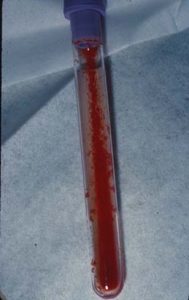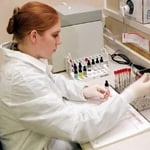Ron Hines DVM PhD
 See What Normal Blood & Urine Values Are
See What Normal Blood & Urine Values Are
 Causes Of Most Abnormal Blood & Urine Tests
Causes Of Most Abnormal Blood & Urine Tests
Your Pet’s (direct) Coombs Test Results
Veterinarians usually run this test on your pet when they are looking for an unexplained cause of anemia, inexplicable skin sores or inflammation surrounding the mouth, eyes and anus. They have already run a PCV and a hemoglobin analysis, and they know that your pet does not have enough red blood cells. Perhaps they were informed by the lab that reticulocytes were present in your pet’s blood as well or perhaps the lab added a note that “autoagglutination” or RBC “clumping” was seen. Since they found no intestinal parasites, like hookworms, blood parasites or evidence of other diseases in their office exams, they want to eliminate the possibility that your pet’s immune system is destroying its own red blood cells. That is evidence that the Coombs test tries to provide. When the Coombs test is positive, it has detected a destructive antibody (IgG class) that your pet has produced against its own red blood cells (aka erythrocytes).
Health Problems That Can Cause Your Dog Or Cat To Become Coombs Positive:
Canine idiopathic immune-mediated hemolytic anemia, heartworm disease, blood parasites, rickettsial diseases, autoimmune diseases such as pemphigus and various forms of lupus. Occasionally occurs post-vaccination – particularly after vaccines containing leptospirosis antigens or a natural infection of leptospirosis organisms. (read here)
What Does A Negative Coombs Test Mean?
A negative test suggests that autoimmunity is not the cause of your dog or cat’s anemia. But it does not guarantee it because 10-30% of dogs with autoimmune causes for their anemia still show up negative on this test – at least in the early stages of their disease. We know considerably less about cats.
A second reason for a negative test is recent or current administration of corticosteroid medications or immunosuppressive medications (like Atopica®/cyclosporin)
Complementary Tests:
Microscopic blood stain examination for blood parasites, (such as babesia in dogs or haemobartonella in cats), reticulocyte count, autoagglutination test, ANA test, thrombocyte count, CBC/ WBC and differential count, bilirubin, prothrombin time, RBC morphology e.g. anisocytosis/ polychromasia, rheumatoid autoimmune factors like the ANA test, occult heartworm test, a leptospirosis PCR test (Idexx 3568, Antech S16510).
DxMe
You are on the Vetspace animal health website
Visiting the products that you see displayed on this website help pay the cost of keeping these articles on the Internet.


